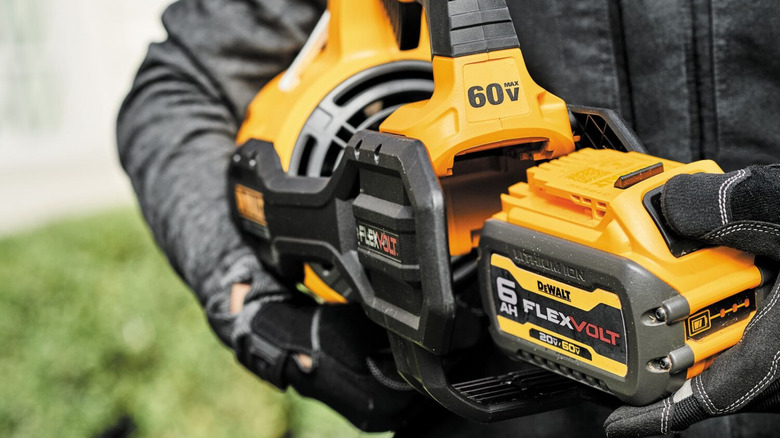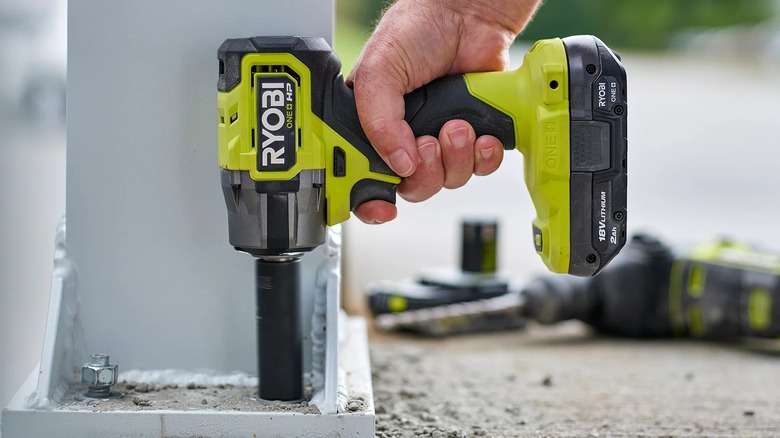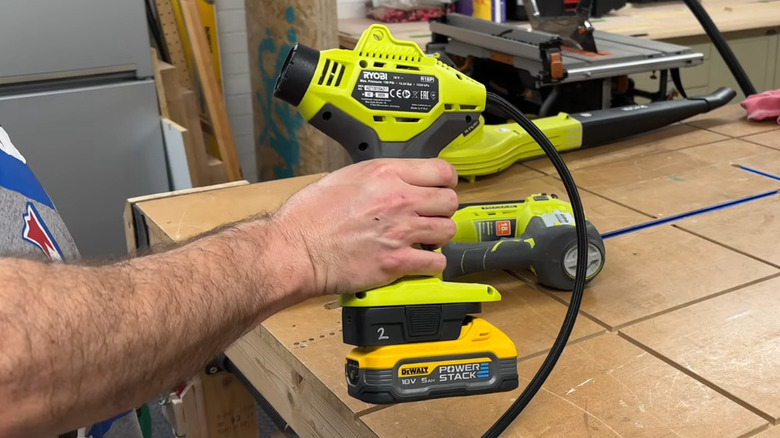Can Ryobi Use Dewalt Batteries? Here's What You Need To Know
We may receive a commission on purchases made from links.
Compared to corded power tools, Ryobi's battery-powered tools are far more convenient. You can work practically anywhere with no need to worry about how far you are from the nearest wall outlet. Additionally, you won't even have to deal with wires cluttering the area.
Another convenient thing about Ryobi home improvement products and batteries is their cross-compatibility. As long as they're part of the same system, you can easily exchange your batteries between them. For instance, 18V ONE+ Impact Wrench can take any 18V ONE+ battery, whether that's a 4Ah, 6Ah, or 12Ah. In that same way, the 40V HP String Trimmer fits perfectly into any battery with the Ryobi 40V HP label.
With all that being said, if a Ryobi tool can accept different batteries within the same Ryobi system, would it also be possible to go off-brand and use a DeWalt battery instead? Unfortunately, no, Ryobi tools can't use DeWalt batteries. But if you're really insistent on pairing the two, there's one workaround you can try.
Why a Ryobi tool and DeWalt battery pairing won't work
There are multiple reasons why using a DeWalt battery on a Ryobi tool won't work, the biggest of which is the difference in battery mounting. DeWalt batteries come in rectangular blocks with the connectors located on top. To use them, you just slide the battery into the DeWalt tool's battery compartment.
On the other hand, Ryobi's battery mounting is designed in a completely unique way. The 18V ONE+ batteries have a box shape with an unconventional vertical connector that plugs into the tool. The batteries from the 40V system are more rectangular, similar to DeWalt's, but the connectors are built on the bottom instead. Finally, the 80V battery for some of Ryobi's lawn mower models looks like a small briefcase, complete with a handle.
Because the Ryobi batteries are configured as such, expect the Ryobi tools to have battery slots different from DeWalt's too. That means there's a mismatch in battery mounting, and you can't readily insert a DeWalt battery into a Ryobi tool just as easily. Not only will it not fit physically, but the connectors won't be aligned either.
Then, there's also the issue of voltage compatibility. DeWalt batteries are rated at 60V, 20V, and 12V. Ryobi's battery-powered power tools only support 80V, 40V, and 18V. Using a voltage lower or higher than what the tool requires is one of the biggest mistakes everyone makes with Lithium batteries. If you pair a 60V DeWalt battery with a 40V Ryobi tool, you risk damaging the tool due to overheating and electrical failure. Similarly, a 20V DeWalt battery won't work on an 80V Ryobi tool and will likely lead to underperformance.
Using a DeWalt battery on a Ryobi tool with an adapter
Although using a DeWalt battery on a Ryobi tool with a significant voltage gap is a bad idea, you might be able to get away with connecting the 20V DeWalt battery with any Ryobi 18V ONE+ tool. There is a slight voltage difference between the two. But the DeWalt battery's nominal voltage — the real voltage that it delivers to the tool under load — is actually just 18V. The 20V it says on the label is simply its maximum initial voltage when disconnected from any load. This makes the 20V DeWalt battery and Ryobi 18V ONE+ tool pairing a good fit.
But, of course, you can't just plug your DeWalt battery into your Ryobi power tool due to the variation in battery slots. You need a third-party Ryobi accessory first, specifically a battery adapter. One popular and highly-rated adapter on Amazon is the X-Adapter Battery Adapter for Ryobi 18V Cordless Tools. It works with the DeWalt 20V MAX* batteries particularly the 1.5Ah, 2Ah, 3Ah, 4Ah, and 5Ah models.
To use the adapter, all you have to do is plug it into your Ryobi 18V ONE+ tool, and then, slide in the 20V DeWalt battery into the slot. Just like the Ryobi 18V ONE+ battery, you can connect the adapter to any tool within the ONE+ system. Keep in mind, though, that aftermarket adapters are not officially supported. They might not fit or perform as perfectly as the original, so proceed with caution.


